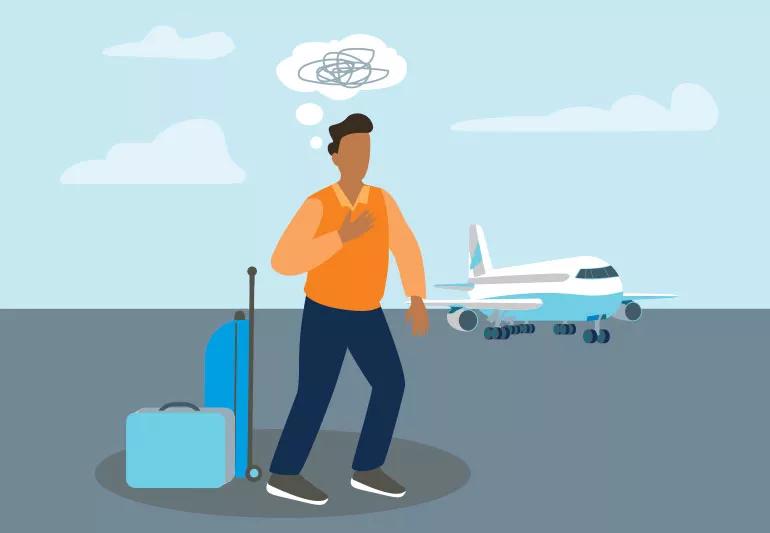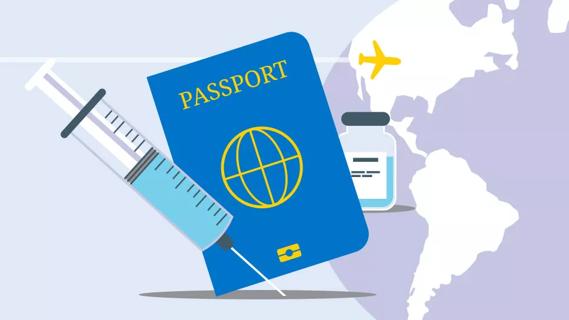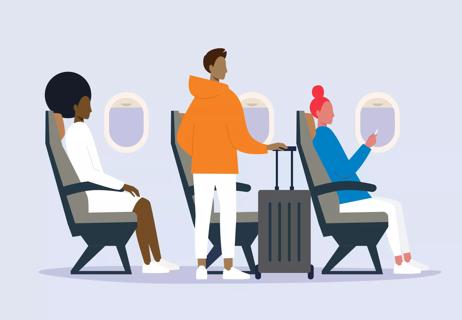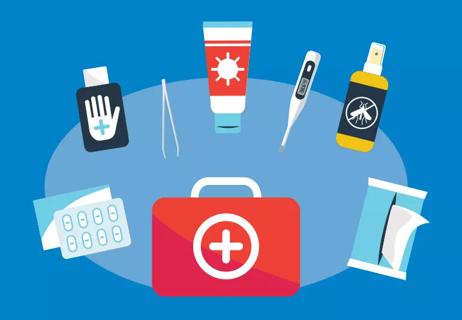Create a checklist, reflect on your needs and ask for help when unexpected delays occur

You’ve been planning for this big trip for months now. But in the hours before you’re supposed to leave, you’re starting to feel really nervous. You keep checking your boarding pass and pining over every little detail, worried you might have missed an important step. You’re double-checking the locks on your front door and keep rethinking whether or not you left something behind.
Advertisement
Cleveland Clinic is a non-profit academic medical center. Advertising on our site helps support our mission. We do not endorse non-Cleveland Clinic products or services. Policy
Maybe your hands are getting a little clammy and your heart rate starts to spike whenever you reach a new destination. And you continue to get nervous whenever you’re around a bunch of people in a crowded airport terminal or bus station.
If travel is causing you to worry more than normal and it’s preventing you from enjoying your trip, you might be dealing with travel-induced anxiety. Clinical psychologist Dawn Potter, PsyD, shares ways to ground yourself in the moment and seize control before your anxiety gets out of hand.
“Travel anxiety is not really one unified concept,” says Dr. Potter. “Travel anxiety could be a bunch of different things for different people.”
Generalized anxiety exists on a spectrum, and if you have an anxiety disorder, your anxiety can run from being very mild to very severe. For some, anxiety can be crippling and debilitating. Others might have high-functioning anxiety and respond in different ways, but the key to understanding anxiety is knowing it can be triggered by a variety of factors at any given time.
“I think for most people, when we talk about having travel anxiety, it means a person is feeling distress either anticipating a trip or during traveling,” says Dr. Potter. “The reason a person might feel that anxiety could be different based on their previous experiences and their own underlying thought processes.”
Advertisement
So, if crowded rooms normally make you feel on edge, your anxiety might be triggered by crowded subway stations or busy airport terminals. If you feel uneasy being alone but you’re traveling abroad, your inner sense of emergency might kick into high gear if you’re flying solo.
“Some people might experience a diffuse sense of anxiety and they might not really know right away why they’re feeling the way they’re feeling,” says Dr. Potter. “In those instances, you might have to do some relaxation techniques, try to get yourself feeling better, distract yourself, and then it might be clearer to target exactly what’s bothering you.”
Yes, it’s OK to feel a little uneasy when you’re outside of your comfort zone. That’s especially true for those of us who haven’t traveled far from home for quite some time. Anxiety, adrenaline and an increase in energy drives us to perform better and, in most cases, focus more. But there’s a stark difference between having a healthy sense of urgency or worry and dealing with anxiety while you’re on the move.
“Some amount of adrenaline and excitedness is fine and good, but when it crosses the line into clinical anxiety, we want to try to do something about it,” notes Dr. Potter.
If you think you might be dealing with travel-induced anxiety, sit down, take a deep breath and ask yourself the following questions:
If you’re experiencing any of these symptoms, and you’re unable to recover from them or they’re preventing you from enjoying your vacation, you may be dealing with anxiety.
“You want to look for these warning signs. It’s not just a feeling of being a little on edge or a little bit nervous,” says Dr. Potter. “If you have to check your boarding pass 10 times to figure out what gate you’re at, that’s a good sign you’re not feeling good.”
So, what’s got you feeling all in a tizzy? Chances are, when you’re right in the thick of traveling, it’s going to be hard to narrow down the direct and immediate cause of what’s making you feel so anxious. Whatever you’re feeling, it’s important that you try not to overthink the situation and take things one step at a time.
Advertisement
If you’re able to check in with yourself and ask those questions listed above, it might be easier to narrow down exactly what’s triggering you. That way, you can start to address your anxiety head-on in the moment and get yourself re-grounded.
Here are some common causes that might set off your anxiety while you’re traveling, and ways to help manage each scenario.
The most common denominator with travel anxiety is the fear of the unknown. If you’re traveling to a destination you’ve never been to before, your anxiety might be triggered by not knowing how you’ll be received when you arrive, not knowing what you can and can’t do in terms of activities, and not knowing if you’ll arrive safely.
Even if you’re going somewhere familiar, like visiting family or returning home after a long time away, you might feel anxious about exactly how the trip might go. And if you only look at the big picture of your entire trip and leave too many of your activities up to chance, you might feel paralyzed by indecision when it comes time to deciding what to do while you’re on vacation.
To combat that uncertainty, it’s good to go into your vacation with a minimal plan: What are the most important things you want to see, do and experience? Once you iron out those big, important moments, allow yourself to have some downtime or wiggle room to change plans, relax or do anything you feel like in the moment.
Advertisement
“You want your plan to be flexible but detailed enough that you’re not stressed about not knowing what to do,” advises Dr. Potter. “Try not fitting too much into any one day and let yourself move things around if you need to.”
And if you’re ever feeling overwhelmed in the moment, take a breather and fall back on your plan: Is there something you want to do differently? Do you need to take a break? If you do, that’s OK — your vacation should be designed to provide you with maximum comfort and minimal worry.
Any number of things can happen when you leave home. Did you turn off all the lights? Did you check to make sure the stove was off? What about making sure your pets are taken care of and fed? And who’s going to collect all that mail piling up on your front porch?
To feel like you’ve got everything managed, create a checklist of all the things you need to wrap up at home before heading out, and have an emergency contact handy in case you need someone to check on things for you while you’re gone.
Things outside of our control happen all the time, but when it happens while we’re traveling, it can feel even more stressful. When unexpected delays happen, flights get canceled or roads get closed, our first line of thinking can be a black-and-white perspective that makes us feel our trip might be ruined.
Advertisement
“With interrupted travel plans, often, it’s very scary at first because you usually find out about the interruption but you don’t find out about the solutions right away,” says Dr. Potter. “The thing to do is try not to panic, try to slow down and take it step by step.”
If you’re flying, speak to a customer service agent who can help you re-route your flight. If you’re running late, notify the people you’re meeting up with so they’re aware of what’s happening and put firm, healthy boundaries in place.
“If you need support, call a person you genuinely trust and won’t amp up your panic, someone who’s reassuring and who might offer solutions but won’t catastrophize with you,” says Dr. Potter. “Give them a heads up and say, ‘I’m not going to be arriving on time, but I will let you know what the new arrival time will be when I’m done figuring it out.’”
Maybe you don’t like being put on the spot or being the center of attention. But if you’re in a new location, particularly one where the majority of people around you speak another language, you may feel stressed and out of your element because of social anxiety.
A good rule of thumb is to at least familiarize yourself with the customs of the place you’re traveling to. If you need help while you’re there, be respectful and kind — in most cases, people are willing to help get you to where you need to go if you approach them with kindness. Even if you’re traveling to a familiar location, there are ways to manage social anxiety in the moment by checking in with yourself, relying on people you know and trying to let go of social pressures that are holding you back.
“People are much more focused on themselves than they are others, and coming back to that idea should be relieving to someone with social anxiety,” notes Dr. Potter. “Don’t put a ton of pressure on yourself to know everything. Just try to be polite and respectful.”
“You’ve got one shot — what will you do with it?” That mindset of making the most of any situation can feel daunting, especially if you’re traveling somewhere you’ve never been and somewhere you’re worried about never having the opportunity to travel to again.
Like with the fear of uncertainty, having a plan in place is important, but if you overcompensate and overthink your plans, you could do more harm than good.
“Having a plan helps reduce uncertainty and helps you make the most of your trip, but having a plan that’s too ambitious creates anxiety,” states Dr. Potter. “A lot of times, when people are traveling, they want to make the most of it so they’re kind of bouncing all over the place doing lots of things to try to fit everything in and that tends to ramp up your anxiety in a different way.”
If this happens, take a step back and try to do an activity that re-centers your train of thought. Maybe take a nap, read a book for an hour or try doing yoga or meditation to slow your thought process and come back to your original reasons for why you’re on vacation.
“Maybe take some time out to just experience things without trying to take a million photos,” suggests Dr. Potter. “These can all be things to try and help manage a generalized sense of anxiety, to be more in the moment.”
Phobias are specific fears that can be severe enough to prevent us from living our lives in a healthy, productive manner — and this is especially true if you’re trying to travel long distances and have a fear of flying or a fear of heights.
Airplane travel affects our bodies in a variety of ways, but if you have a phobia that impacts your ability to even think about getting on a plane, it might be out of the question for you.
“If you have a phobia and it’s severe enough that you either avoid that thing you’re afraid of or endure it with so much distress that you’re panicking or need to have somebody with you at all times when you’re doing it, you probably need professional help to overcome that phobia,” says Dr. Potter.
One possible treatment known as exposure therapy could help. In exposure therapy, your doctor gradually exposes you to the thing you’re afraid of. So, for example, if you’re afraid of flying, maybe you start by studying a blueprint of an airplane, then work your way up to imagining yourself on an airplane and — eventually, when you’re ready — taking a small flight.
“The idea is to help them become used to that thing they’re afraid of so that their fear response decreases,” explains Dr. Potter. “People with phobias that are interfering with their daily lives should really consult with a professional and not try to do exposure therapy on their own because throwing yourself headfirst into a situation you’re afraid of could make you feel overwhelmed or flooded with a strong emotional response.”
If you’re consistently experiencing anxiety while traveling, or you’ve tried some solutions and none of them worked, you might want to speak to a healthcare professional who can provide coping techniques and other treatments to address your travel anxiety.
“Our leisure time should be restoring us, not causing us more stress,” encourages Dr. Potter. “If your anxiety is causing more than mild stress, if it’s interfering with your ability to enjoy travel or interfering with your desire to travel and it’s preventing you from doing it, that’s something you want to talk to your doctor about.”

Sign up for our Health Essentials emails for expert guidance on nutrition, fitness, sleep, skin care and more.
Learn more about our editorial process.
Advertisement

Making a health plan with your doctor before you leave will make it easier to sit back and enjoy your flight

Among other benefits, a little time away can help make you more creative, decisive and focused

Setting realistic expectations and scheduling downtime can help reduce stress and make your time away more enjoyable

Dress baby in layers, gate-check your stroller and bring noise-canceling headphones

Plan early — getting the right vaccines can help you stay healthy on your travels

Flying can cause dehydration and bloating and make you feel tired and stressed

When the drive is familiar or monotonous, ‘procedural memory’ can take the wheel

How to pack a well-stocked travel emergency kit

The tropical fruit is a good source of antioxidants and vitamin C

Most people fall asleep within 10 to 20 minutes, but if your experience is different, adjusting your sleep schedule may help

Exploring your hidden side can lead to better understanding of what makes you tick